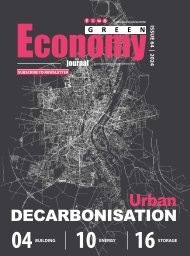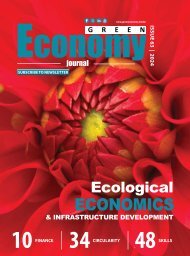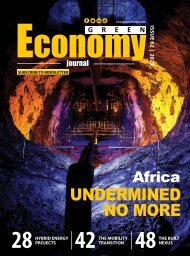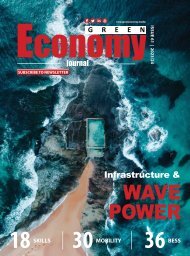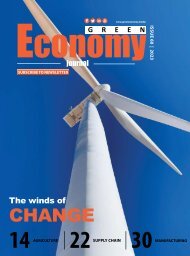Green Economy Journal Issue 58
Create successful ePaper yourself
Turn your PDF publications into a flip-book with our unique Google optimized e-Paper software.
MOBILITY<br />
MOBILITY<br />
Toyota believes that<br />
hydrogen is the catalyst for<br />
energy decarbonisation.<br />
Energy Observer Productions I Amélie Conty<br />
TOYOTA FUEL-CELL TECHNOLOGY<br />
opens new horizons for<br />
The Toyota fuel-cell-powered Energy Observer boat docks in Cape Town in June 2023. This<br />
state-of-the-art sustainability project demonstrates the adaptability of Toyota hydrogen fuelcell<br />
technology.<br />
Former racing catamaran turned ship of the future, Energy<br />
Observer, has made waves on its seven-year odyssey around<br />
the world as the first energy-autonomous hydrogen vessel.<br />
Toyota, official partner of Energy Observer and an avid supporter of<br />
their project from the start, specially developed a fuel-cell system<br />
for the Energy Observer maritime application.<br />
Energy Observer is an electrically propelled vessel of the future that is<br />
operated using a mix of renewable energies and an on-board system<br />
that produces carbon-free hydrogen from seawater. The operators of<br />
the vessel are on a mission to meet people in 50 countries and 101<br />
ports during their voyage, with an aim to prove that a cleaner world<br />
is not only possible but that the innovations can open doors to new<br />
sustainable energy systems. Their activities also demonstrate and<br />
share potential solutions to champion an ecological and energy<br />
transition – a challenge facing South Africa in particular.<br />
18<br />
Energy Observer in Svalbard.<br />
SUSTAINABILITY<br />
ENERGY OBSERVER<br />
Toyota’s fuel-cell system, first introduced in the Toyota Mirai, the<br />
world’s first mass-produced hydrogen fuel-cell electric vehicle, proved<br />
its value as a propulsion system on the road. However, the company<br />
has more recently been exploring the use of its fuel cell in other<br />
applications such as buses and trucks.<br />
Toyota as a company is aiming to develop a hydrogen society and<br />
to “establish a future society in harmony with nature,” as stated in its<br />
The project successfully demonstrates<br />
the adaptability of the Toyota fuel-cell<br />
technology to a variety of applications.<br />
Energy Observer Productions I Antoine Drancey<br />
Energy Observer Productions I Amélie Conty<br />
Solar and hydrogen technologies onboard Energy Observer.<br />
OVERVIEW OF THE BOAT<br />
Length<br />
31m<br />
Width<br />
13m<br />
Weight<br />
30 tons<br />
Height 14,85m<br />
Draft 2.2m<br />
Crew members 5<br />
Average speed 5/6 knots<br />
Energy Observer in Sweden.<br />
The Energy Observer Foundation Exhibition village will be on display<br />
at Jetty 2 at the V&A Waterfront harbour from 12 to 18 June. Entrance<br />
is free and talks and videos about Energy Observer's Odyssey, the<br />
17 Sustainable Development Goals (SDGs) and energy transition in<br />
South Africa will take place daily.<br />
Victorien Erussard, captain and founder of Energy Observer.<br />
The Toyota Fuel Cell System integrated in Energy Observer.<br />
BEYOND ZERO:<br />
Achieving zero and adding new value beyond it as part of efforts to<br />
pass our beautiful Home Planet to the next generation, Toyota has<br />
identified and is helping to solve issues faced by individuals and<br />
society, which Toyota calls “Achieving Zero”. Toyota is also looking<br />
“Beyond Zero” to create and provide greater value by continuing to<br />
seek ways to improve lives and society for the future.<br />
For more information about Beyond Zero visit: https://global.<br />
toyota/en/mobility/beyond-zero/<br />
Environmental Challenge 2050 – this aligned perfectly with Energy<br />
Observer’s mission and activities. From that common ground, the two<br />
have worked closely together on how a hydrogen fuel-cell system<br />
could be adapted to maritime applications.<br />
The maritime-specific system was developed by Toyota Technical<br />
Center Europe in a mere seven months. It required a redesign of<br />
the Mirai’s system, followed by the build and installation of the<br />
compact fuel-cell module. The project successfully demonstrates<br />
the adaptability of the Toyota fuel-cell technology to a variety of<br />
applications outside of land-based vehicles.<br />
“We are proud of the association with Toyota and its fuel-cell<br />
system, as used on our ocean passages and tested in the roughest<br />
conditions. After seven years and nearly 50 000 nautical miles of<br />
travelling, including three ocean crossings, the Energy Observer<br />
energy supply and storage system is now very reliable. We believe<br />
that the Toyota fuel-cell system is the perfect component for this,<br />
industrially produced, efficient and safe. Being an ambassador for the<br />
Sustainable Development Goals (SDGs), our mission is to promote<br />
clean energy solutions and we share with Toyota the same vision for<br />
a hydrogen society,” says Victorien Erussard, founder and captain of<br />
Energy Observer.<br />
The Toyota fuel-cell system has proven its benefits already for<br />
many years in the first-generation Mirai, and into the second<br />
generation zero-emissions vehicle revealed in South Africa earlier<br />
this year, but more recently other applications such as buses and<br />
trucks have been under development. Toyota believes that hydrogen<br />
is the catalyst for energy decarbonisation and such technology<br />
acceptance can accelerate modular fuel-cell solutions.<br />
19




